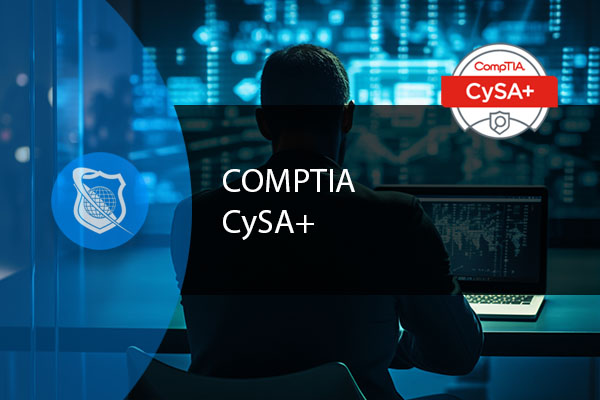What Is CompTIA CySA+?
CompTIA CySA+ (CompTIA Cybersecurity Analyst) is a cybersecurity certification designed to validate an IT professional’s ability to proactively defend and continuously improve the security of an organization. The certification focuses on the application of behavioral analytics to networks and devices to prevent, detect, and combat cybersecurity threats through monitoring and data analysis. It covers essential cybersecurity skills, including threat detection, data analysis, interpretation of results, and the implementation of protective measures against cyber threats.
CompTIA CySA+ Associated Exams
- Exam Code: CS0-002 (as of the last update)
- Format: Multiple-choice and performance-based questions
- Length: Up to 165 minutes
- Number of Questions: Maximum of 85 questions
- Delivery Method: Pearson VUE testing centers or online proctoring
- Passing Score: 750 (on a scale of 100-900)
CompTIA CySA+ Exam Costs
- Estimated Cost: $370 USD (varies by location and is subject to change)
CompTIA CySA+ Exam Objectives
- Threat and Vulnerability Management: Identifying and analyzing vulnerabilities, conducting threat analysis, and implementing mitigation strategies.
- Software and Systems Security: Applying security solutions for infrastructure management and software development.
- Security Operations and Monitoring: Implementing security solutions and monitoring cybersecurity incidents.
- Incident Response: Preparing for and responding to cybersecurity incidents.
- Compliance and Assessment: Understanding and applying compliance and assessment procedures to ensure data security and integrity.

CompTIA CySA+ Training
Ready to fortify digital landscapes? Unleash your potential with our CySA+ course. Master behavioral analytics, shield networks, and become a certified defender against cyber threats. Elevate your security prowess, ace the CompTIA CySA+ (CS0-003) exam, and secure a resilient future for organizations
Frequently Asked Questions Related to CompTIA CySA+
Who should take the CompTIA CySA+ exam?
Individuals aiming to pursue a career in cybersecurity, particularly in roles such as cybersecurity analyst, threat intelligence analyst, security operations center (SOC) analyst, and vulnerability analyst.
What prerequisites are required for the CompTIA CySA+?
While there are no mandatory prerequisites, it is recommended that candidates have Network+ or Security+ certifications, or equivalent knowledge, plus a minimum of 4 years of hands-on information security or related experience.
How long is the CompTIA CySA+ certification valid?
The certification is valid for three years from the date of passing the exam. It can be renewed through CompTIA’s Continuing Education (CE) program.
Is the CompTIA CySA+ exam difficult?
The difficulty of the exam depends on the individual’s background and experience in cybersecurity. It requires a solid understanding of cybersecurity practices and tools.
Can CompTIA CySA+ lead to other certifications or career paths?
Yes, earning the CySA+ certification can be a stepping stone to more advanced certifications, such as CompTIA Advanced Security Practitioner (CASP+) or other vendor-specific certifications. It can also enhance career opportunities in cybersecurity.
Key Term Knowledge Base: Key Terms Related to CompTIA CySA+
Understanding the key terms related to CompTIA Cybersecurity Analyst (CySA+) is crucial for professionals looking to specialize in cybersecurity analysis. This certification focuses on equipping individuals with the knowledge and skills needed to apply behavioral analytics to networks and devices to prevent, detect, and combat cybersecurity threats. The CySA+ certification is globally recognized and validates an IT professional’s ability to proactively defend and continuously improve the security of an organization. Here’s a list of key terms that are essential for anyone studying for the CySA+ exam or working in cybersecurity analysis.
| Term | Definition |
|---|---|
| Threat Intelligence | The collected information about existing or potential attacks that threaten an organization. |
| Vulnerability Management | The process of identifying, evaluating, treating, and reporting on security vulnerabilities in systems and the software that runs on them. |
| Security Information and Event Management (SIEM) | A set of tools and services offering a holistic view of an organization’s information security. |
| Incident Response | The approach taken by an organization to prepare for, detect, contain, and recover from a data breach. |
| Intrusion Detection System (IDS) | A device or software application that monitors a network or systems for malicious activity or policy violations. |
| Intrusion Prevention System (IPS) | A network security/threat prevention technology that examines network traffic flows to detect and prevent vulnerability exploits. |
| Network Traffic Analysis | The process of intercepting, recording, and analyzing network traffic communication patterns in order to detect and respond to security threats. |
| Endpoint Detection and Response (EDR) | A cybersecurity technology that addresses the need for continuous monitoring and response to advanced threats. |
| Penetration Testing | The practice of testing a computer system, network, or web application to find vulnerabilities that an attacker could exploit. |
| Security Orchestration, Automation, and Response (SOAR) | Technologies that enable organizations to collect inputs monitored by the security operations team. |
| Cybersecurity Frameworks | Standards, guidelines, and best practices to manage cybersecurity-related risk. |
| Risk Assessment | The process of identifying, analyzing, and evaluating risk. |
| Cloud Security | The set of policies, controls, procedures, and technologies that work together to protect cloud-based systems, data, and infrastructure. |
| Cryptography | The practice and study of techniques for secure communication in the presence of third parties known as adversaries. |
| Malware Analysis | The process of understanding the behavior and purpose of a malicious software. |
| Forensic Analysis | The study and application of computer investigation and analysis techniques in the interests of determining potential legal evidence. |
| Threat Hunting | Proactively searching for cyber threats that are lurking undetected in a network. |
| Vulnerability Scanning | The automated process of proactively identifying security vulnerabilities of computing systems in a network in order to determine if and where a system can be exploited and/or threatened. |
| Compliance and Ethics | Understanding the legal and regulatory standards that apply to information security and how they affect security policies and procedures. |
| Data Protection | Measures taken to prevent unauthorized access to or use of personal or corporate data. |
These terms represent foundational concepts within the field of cybersecurity analysis that the CompTIA CySA+ certification covers. Mastery of these concepts is essential for professionals aiming to effectively protect their organizations from cybersecurity threats.
















